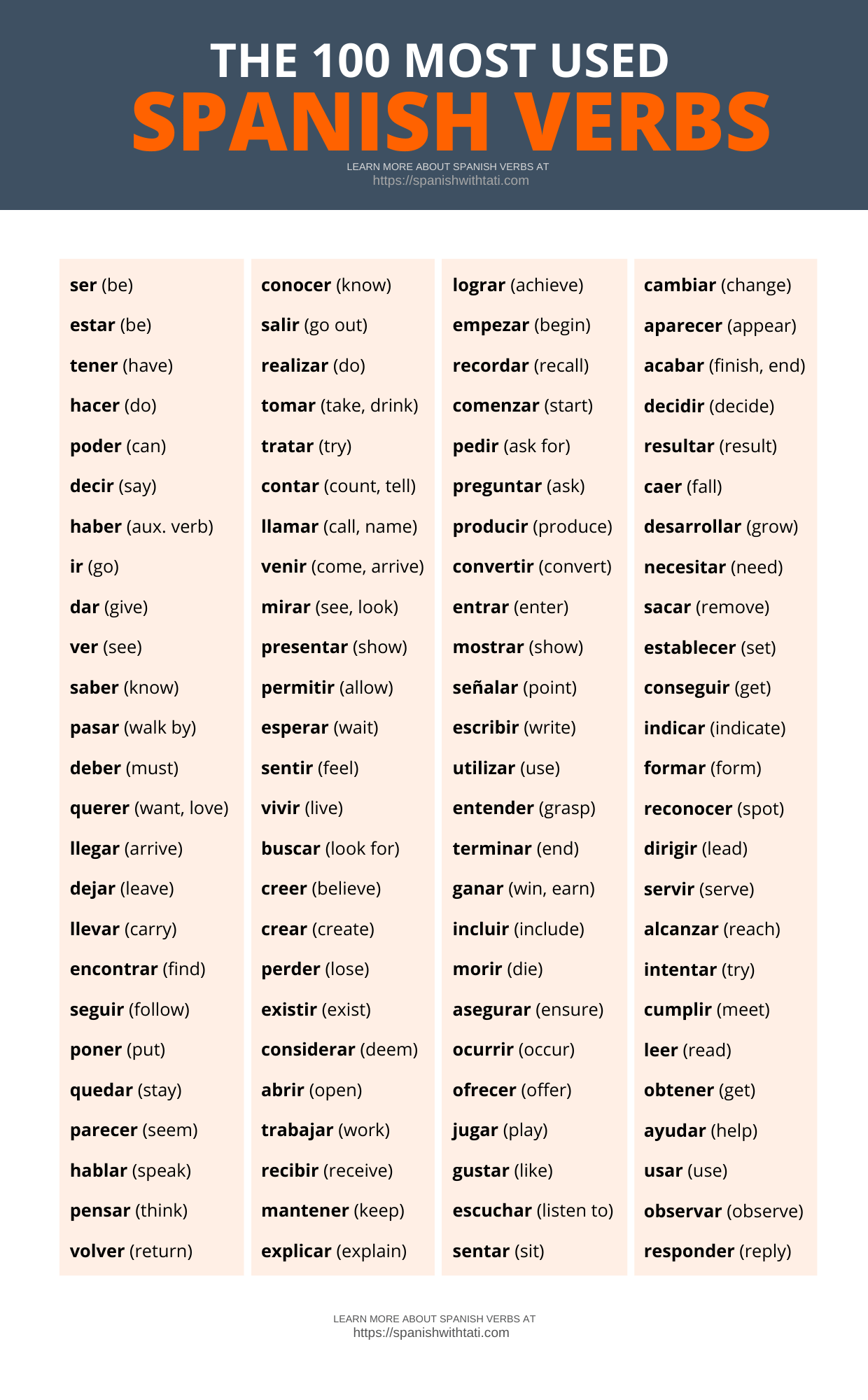These are the 100 most used verbs according to CORPES XXI, a document that can be used to identify the most used words in a language.

100 Spanish Verbs
The following 100 Spanish verbs appear in order of frequency.
Ser is considered the most used verb in the Spanish language.
Verbs with an irregular conjugation pattern or with spelling changes in any of their tenses are in red.
Would you rather have this list of 100 Spanish verbs in PDF format? Download this printable version here.
- ser (be) | conjugation
- estar (be) | conjugation
- tener (have) | conjugation
- hacer (do, make) | conjugation
- poder (can) | conjugation
- decir (say) | conjugation
- haber (aux. verb) | conjugation
- ir (go) | conjugation
- dar (give) | conjugation
- ver (see) | conjugation
- saber (know) | conjugation
- pasar (walk by, pass)
- deber (must, have to)
- querer (want, love)
- llegar (arrive)
- dejar (leave)
- llevar (carry)
- encontrar (find)
- seguir (follow)
- poner (put)
- quedarse (stay)
- parecer (seem)
- hablar (speak)
- pensar (think) | conjugation
- volver (return)
- conocer (know)
- salir (go out)
- realizar (do, realize)
- tomar (take, drink)
- tratar (try, deal with)
- contar (count, tell)
- llamarse (call, name)
- venir (come, arrive)
- mirar (see, look)
- presentar (present, show)
- permitir (allow)
- esperar (wait)
- sentir (feel)
- vivir (live)
- buscar (look for)
- creer (believe)
- crear (create)
- perder (lose)
- existir (exist)
- considerar (consider)
- abrir (open)
- trabajar (work)
- recibir (receive)
- mantener (maintain)
- explicar (explain)
- lograr (achieve)
- empezar (begin)
- recordar (remember)
- comenzar (start)
- pedir (ask for)
- preguntar (ask)
- producir (produce)
- convertir (convert, change)
- entrar (enter)
- mostrar (show)
- señalar (point)
- escribir (write)
- utilizar (use)
- entender (understand)
- terminar (end)
- ganar (win, earn)
- incluir (include)
- morir (die)
- asegurar (ensure, secure)
- ocurrir (occur)
- ofrecer (offer)
- jugar (play)
- gustar (like)
- escuchar (listen to)
- sentar (sit)
- cambiar (change)
- aparecer (appear)
- acabar (finish, end)
- decidir (decide)
- resultar (result, prove)
- caer (fall)
- desarrollar (develop)
- necesitar (need)
- sacar (remove)
- establecer (establish, set)
- conseguir (get)
- indicar (indicate)
- formar (form)
- reconocer (recognize)
- dirigir (lead)
- servir (serve)
- alcanzar (reach)
- intentar (try)
- cumplir (accomplish)
- leer (read)
- obtener (get)
- ayudar (help)
- usar (use)
- observar (observe)
- responder (answer)
How to Learn Spanish Verbs
When my friends ask me for tips on how to learn verbs in Spanish, I usually give them these pieces of advice…
1. Learn their meaning, pronunciation, and spelling.
2. Learn to conjugate verbs in Spanish.
To learn about Spanish verb conjugation, visit the post called How to Conjugate Regular Verbs in Spanish.
Or watch this video.
3. Create a story or meaningful examples with every verb you want to learn. It will help you learn their use and practice their conjugation.
4. Get a teacher or a friend to correct your texts or speech because practicing something incorrectly can be worse than not practicing at all.
You can find reliable teachers at Homeschool Spanish Academy. It’s an academy based in Guatemala, and I like the teachers because…
● They are all certified Spanish teachers.
● They are all native Spanish speakers based in Antigua, Guatemala.
● They all receive constant, extra training in-house.
25-minute lessons cost $7.65 per class when you buy a package.
Scholarly Sources
I used something called CORPES XXI to create the list of verbs above. CORPES XXI is a corpus.
A corpus is a collection of texts (plays, film scripts, press releases, essays, transcripts of radio or television news, transcripts of conversations, and speeches), and they can be used to identify the most used words in a language.
CORPES XXI is the most current corpus available in the Spanish language. Actually, it was last updated in July, 2021.

Curious about the most used irregular verbs in Spanish? Visit the post called Top 25 Spanish Irregular Verbs.
Think this is neat? Share it with your friends!



![List of Stem Changing Verbs in Spanish [+150 Verbs]](https://spanishwithtati.com/wp-content/uploads/2021/03/spanish-stem-changing-verbs-440x264.png)
![The Spanish Imperative Mood [Give Commands]](https://spanishwithtati.com/wp-content/uploads/2022/10/imperative-of-tu-440x264.webp)